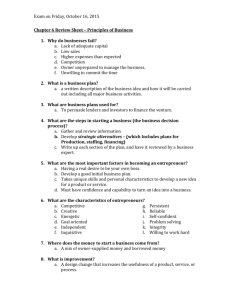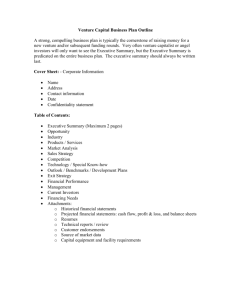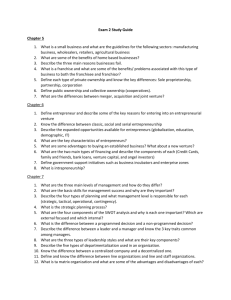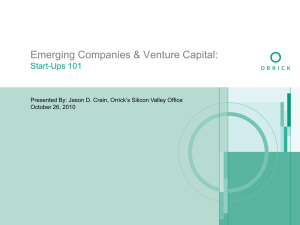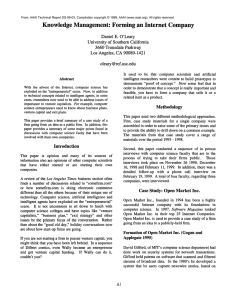Funding Termonology
advertisement
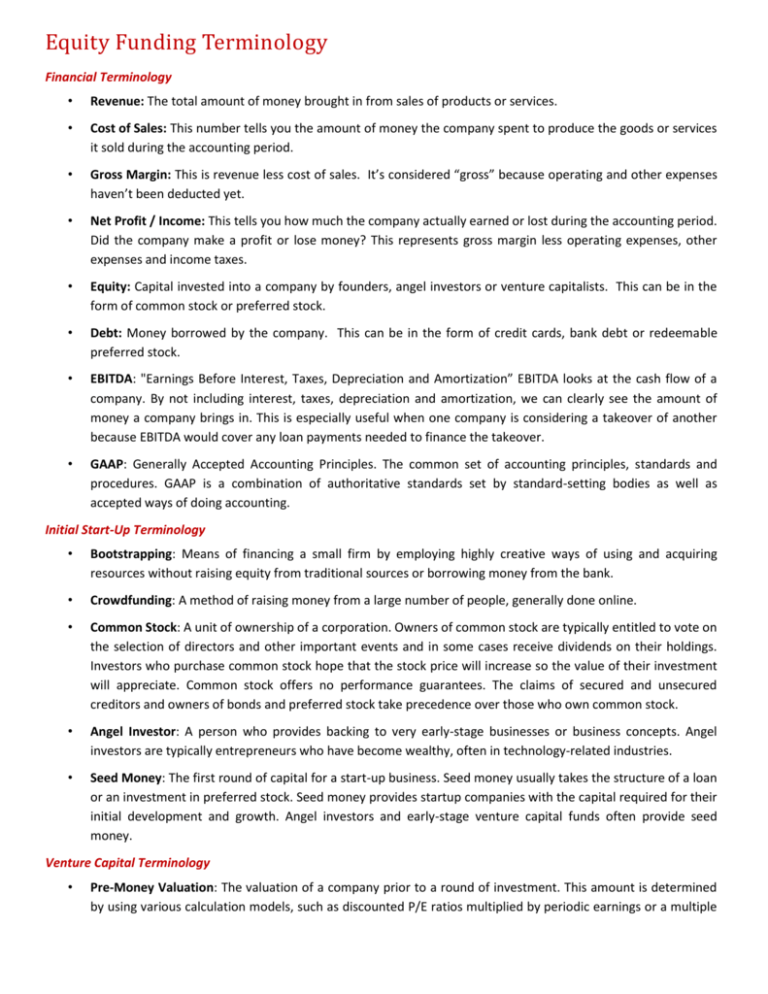
Equity Funding Terminology Financial Terminology • Revenue: The total amount of money brought in from sales of products or services. • Cost of Sales: This number tells you the amount of money the company spent to produce the goods or services it sold during the accounting period. • Gross Margin: This is revenue less cost of sales. It’s considered “gross” because operating and other expenses haven’t been deducted yet. • Net Profit / Income: This tells you how much the company actually earned or lost during the accounting period. Did the company make a profit or lose money? This represents gross margin less operating expenses, other expenses and income taxes. • Equity: Capital invested into a company by founders, angel investors or venture capitalists. This can be in the form of common stock or preferred stock. • Debt: Money borrowed by the company. This can be in the form of credit cards, bank debt or redeemable preferred stock. • EBITDA: "Earnings Before Interest, Taxes, Depreciation and Amortization” EBITDA looks at the cash flow of a company. By not including interest, taxes, depreciation and amortization, we can clearly see the amount of money a company brings in. This is especially useful when one company is considering a takeover of another because EBITDA would cover any loan payments needed to finance the takeover. • GAAP: Generally Accepted Accounting Principles. The common set of accounting principles, standards and procedures. GAAP is a combination of authoritative standards set by standard-setting bodies as well as accepted ways of doing accounting. Initial Start-Up Terminology • Bootstrapping: Means of financing a small firm by employing highly creative ways of using and acquiring resources without raising equity from traditional sources or borrowing money from the bank. • Crowdfunding: A method of raising money from a large number of people, generally done online. • Common Stock: A unit of ownership of a corporation. Owners of common stock are typically entitled to vote on the selection of directors and other important events and in some cases receive dividends on their holdings. Investors who purchase common stock hope that the stock price will increase so the value of their investment will appreciate. Common stock offers no performance guarantees. The claims of secured and unsecured creditors and owners of bonds and preferred stock take precedence over those who own common stock. • Angel Investor: A person who provides backing to very early-stage businesses or business concepts. Angel investors are typically entrepreneurs who have become wealthy, often in technology-related industries. • Seed Money: The first round of capital for a start-up business. Seed money usually takes the structure of a loan or an investment in preferred stock. Seed money provides startup companies with the capital required for their initial development and growth. Angel investors and early-stage venture capital funds often provide seed money. Venture Capital Terminology • Pre-Money Valuation: The valuation of a company prior to a round of investment. This amount is determined by using various calculation models, such as discounted P/E ratios multiplied by periodic earnings or a multiple times a future cash flow discounted to a present cash value and a comparative analysis to comparable public and private companies. • Post-Money Valuation: The valuation of a company immediately after the most recent round of financing. For example, a venture capitalist may invest $3.5 million in a company valued at $2 million "pre-money" (before the investment was made). As a result, the startup will have a post-money valuation of $5.5 million. • IRR: Internal Rate of Return. A typical measure of how VC Funds measure performance. IRR is technically a discount rate: the rate at which the present value of a series of investments is equal to the present value of the returns on those investments. • Preferred Stock: A class of capital stock that may pay dividends and has priority over common stock in the payment of dividends and the liquidation of assets. Many venture capital investments use preferred stock as their investment vehicle. Preferred stock is convertible into common stock at the time of an IPO or when acquired. • "A" Round: A financing event whereby venture capitalists invest in a company that was previously financed by founders and/or angels. The "A" is from Series "A" Preferred stock. • "B" Round: A financing event whereby professional investors such as venture capitalists are sufficiently interested in a company to provide additional funds after the "A" round of financing. Subsequent rounds are called "C", "D", and so on. • Mandatorily Redeemable Preferred Stock: Requires the company to buy back the stock of the holder which in turn gives the holders (potentially converting to creditors) leverage to induce the company to arrange a liquidity event. The threat of creditor status can move the founders to act if a liquidity event is not occurring with sufficient rapidity. • Warrant: A type of security that entitles the holder to buy a proportionate amount of common stock or preferred stock at a specified price for a period of years. Warrants are usually issued together with a loan, a bond or preferred stock --and act as sweeteners, to enhance the marketability of the accompanying securities. They are also known as stock-purchase warrants and subscription warrants. • Incentive Stock Options: A widely used form of employee and consultant incentive and compensation. The employee is given an option to purchase its shares at a certain price (at or below the market price at the time the option is granted) for a specified period of years. • Burn Rate: The rate at which a company expends net cash over a certain period, usually a month. • Cram Down: Extraordinary dilution, by reason of a round of financing, of a non-participating investor's percentage ownership in the issuer. • Down Round: Issuance of shares at a later date and a lower price than previous investment rounds. • Liquidity Event / Exit: An event that allows a VC to realize a gain or loss on an investment. The ending of a private equity provider’s involvement in a business venture with a view to realizing an internal return on investment. • Closing: An investment event occurring after the required legal documents are implemented between the investor and a company and after the capital is transferred in exchange for company ownership or debt obligation. • Initial Public Offering (IPO): The sale or distribution of a stock of a portfolio company to the public for the first time. IPOs are often an opportunity for the existing investors (often venture capitalists) to receive significant returns on their original investment.
